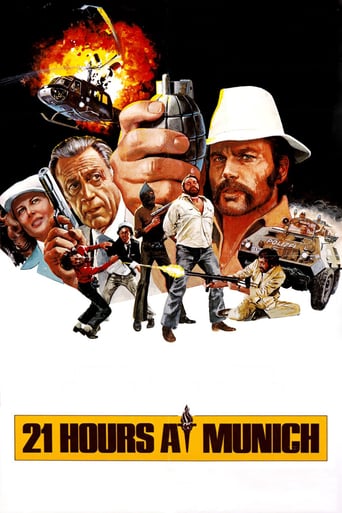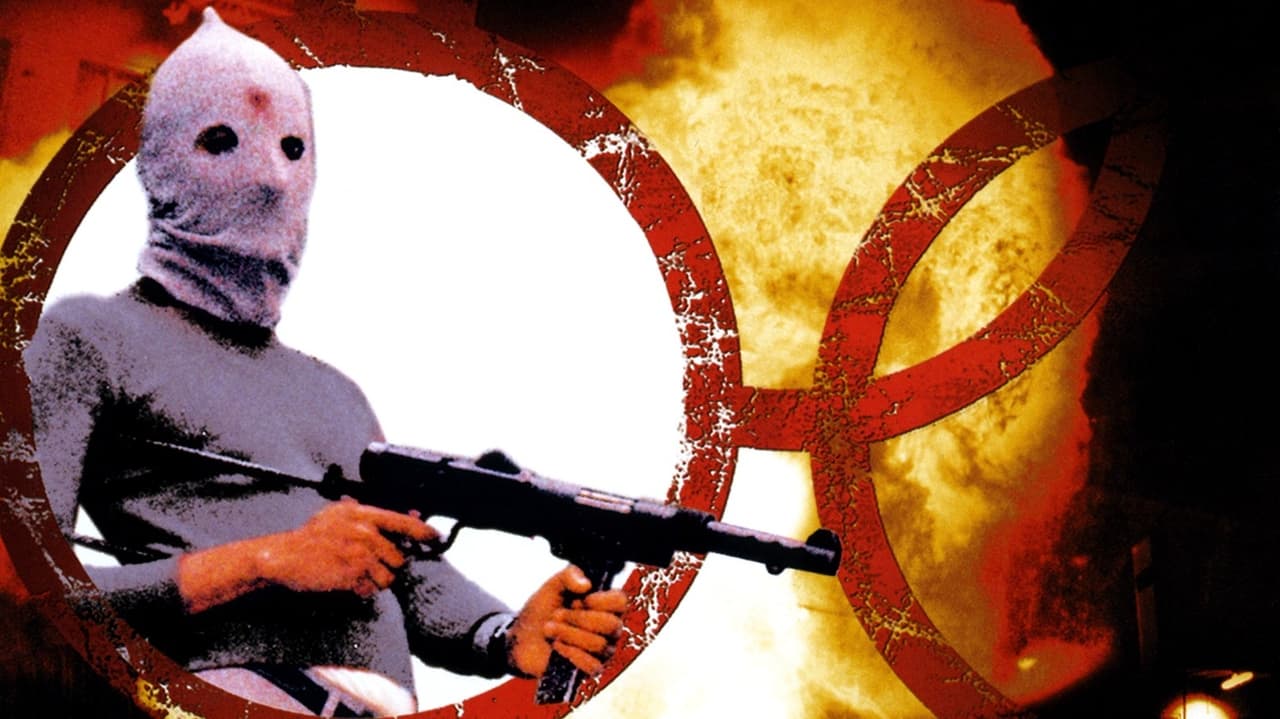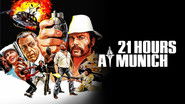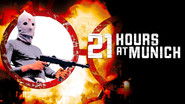Coventry
I've vaguely picked up a thing or two about the infamous so-called "Munich Massacre" in school and from quizzes, but the best way to learn about our world's darkest history pages remains watching a lot of movies (and preferably not the Oscar-winning blockbuster types directed by Steven Spielberg). "21 Hours at Munich" is a straightforward and raw, but hugely compelling, re-telling of the tragedy that occurred during the Summer Olympics of 1972 held in Munich. Several members of the Palestinian terrorist organization Black September invaded the Olympic village, which clearly suffered from a lack of proper security and basic surveillance, and took hostage of nine Israeli athletes and coaches. Two people were violently killed during the takeover. The terrorists' demands were clear and nonnegotiable, namely the release of no less than 234 fellow Palestinian rebels in various Israeli prisons, but Israel denied all forms of collaboration and thus the only thing German authorities could do was try and gain extra time. Less than a day later, hence the title, the act of terrorism resulted in a genuine blood bath at Fürstenfeldbruck Airport, where the nine hostages as well as most of the terrorists got killed by gunfire. As indicated above already, I wasn't all too familiar with the detailed facts surrounding the Munich Massacre, hence I can't fully judge the accuracy of this film. But, since it's a made-for-TV production that puts the emphasis on dialogs and factual settings instead of sensationalism, I daresay the movie is probably the most accurate depiction of what really happened. The drama effect of the film is quickly established since it's clear from the beginning that the hostage situation can't but result in a tragedy. The Israeli government rejects all negotiations and pushes the responsibility back to the German authorities. Then, the terrorists demand to flee to Cairo but the Egyptian government rejects all negotiations and pushes the responsibility back to the German authorities. For Germany, the situation is extra delicate because of their negative historical reputation. After all, the entire world is watching skeptically whether or not they will prevent the Jewish athletes from dying on German soil. Fascinating, real-life dramatic subject matter makes this one a truly recommended 70's movie. "21 Hours at Munich" is suspenseful and harsh, but always remains respectful towards the victims and never at one point exploits the violent and/or political aspects of the events. The acting performances are terrific, albeit the casting couldn't have been easy. Franco Nero, as the terrorist leader, doesn't look Arabian at all, but nevertheless delivers a powerfully bleak and emotionless performance. William Holden is great as the German chief of police, but Shirley Knight is somewhat redundant as the only female character in the entire movie. She plays the spokesperson of the Olympic committee and – fruitlessly - attempts to create a bond with the terrorists' leader. Also, keep an eye open for David Hess (the psycho from "Last House on the Left") as one of the Israeli hostages.
Robert J. Maxwell
Five members of Black September take a dozen or so Israeli athletes hostage at the Munich Olympics in 1972, killing two others. Led by Franco Nero, they demand the release of more than two hundred Palestinian prisoners in Israeli jails. Israel refuses to agree and the German authorities (William Holden as Schreiber, Chief of the Munich Police; Shirley Knight as head of Women's Olympic Security; Richard Basehart as Willie Brandt) are stuck with the nasty task of trying to resolve the problem themselves. They botch the job. There is a shootout at the airport and all the hostages are killed, along with some of the terrorists. The surviving killers are released from jail later, when other terrorists hijack an airliner and hold seventeen passengers hostage.This is a linear narrative. It illustrates the sorts of glitches that authorities run into when faced with an unanticipated problem. Unanticipated -- Hell, inconceivable. No one could any more imagine hostages being taken at the 1972 Olympics than he could imagine the simultaneous hijacking of four American airliners by terrorists intent on flying them into buildings. The first German to talk to the terrorists, played by Shirley Knight, walked up to the captors and angrily demanded to know, "What IS this rubbish?" (The encounter is shown a little differently in the film.) Until the dimensions of the situation were clarified -- the dead bodies, the impossible demands -- it was treated as a breach of etiquette. No one in a position of power had any idea of the correct course. Nothing like this had ever happened before.Happily the film shows all the points of view, without slipping into pathos. It doesn't have to be sentimentalized. A mature audience must already be aware of the emotions involved. Yet the documentary approach robs the film of some of its dramatic impact. It isn't helped by the acting. The performances are, with a few exceptions, below the expectable par. Richard Basehart, whose work I've admired elsewhere, has the élan of an animatronic figure in Disneyland.Still it's good to see the events laid out evenly and schematically. Anthony Quayle is on the spot as an Israeli security adviser. And several Moslems, including an Egyptian and a representative of the Arab League, are brought in to try talking the terrorists out of their plan. The simpler, and more devious approach is to treat the Israelis as humans, demonize the murderers, and show the rest of the world as indifferent, with the Germans perhaps even complicit. This is more or less what "One Day in Munich" does. Spielberg's "Munich" is slanted in the same direction, although it's in most ways a film for adults. Spielberg deletes the accidental killing of an innocent Arab waiter in Lillihammer, Norway, and doesn't mention the death and wounding of several German police officers at the climactic shootout. In a way, Spielberg's movie is an apologia for Mossad, as "The Godfather" was an apologia for the Mafia. (I'm comparing the structure of the movies, not the organizations.) The annoying little things are left out.And one can't help wondering about that "no negotiating for hostages" axiom either. Why not? If they give in, every Israeli everywhere will become a target? Well, a rat in a Skinner box will certainly repeat activities for which he's rewarded, and he'll avoid those for which he's punished. Some of the rules obviously apply to humans as well. (The slot machines in Vegas put the player on a fractional reenforcement schedule designed to maximize the response -- feeding the machine coins -- while minimizing the payoff.) But in a complex conundrum like this? The Arabs take hostages at Munich and lose. Later, they take hostages on an airliner and win. Punishment in one case, reward in the other. Did the difference in outcome lead to differences in later behavior? Nobody knows. A few focus groups would help, if you can get terrorists to agree to participate in them. The script presents some interesting ideas. Shirley Knight and Franco Nero have gotten to know one another a bit towards the end. By this time it's clear that Israel will not negotiate and Nero's plan is shot. Knight tells him, reasonably and not ungently, that the entire world is watching to see what he will do next. Wouldn't it be a good idea, she insinuates, if Nero showed the world the more favorable profile of his movement and released the remaining hostages and put an end to the killing? From her lips to the skies. "What?", Nero bristles, "and have people think I am a coward?" And Knight replies, "So these people must die for your vanity?" It's a provocative question -- how many innocent people must die to preserve one man's self image? If the movie doesn't exactly reach out and grab you by the lapels and shake you back and forth, I'm still glad it was made.
unbrokenmetal
A semi-documentary movie about the terrorist attack on the Israeli team at the Olympic Games at Munich 1972. In opposite to later adaptations of the same historical event, "21 Hours at Munich" was shot on the original locations. However, it is a little bit less of a documentary than it seems at first, it does take a bit of creative freedom in the narration. Which has been criticized by some reviewers, but makes it a better movie after all. Excellent performances by William Holden as the police chief and Franco Nero as the terrorist leader, whose motivation is explained remarkably well. He is not just the one-dimensional Hollywood villain firing bullets in all directions. That was important to make the film believable, as well as the discussions between the politicians. Even it makes the movie quite wordy, the reasons why and when and how the police fights the terrorists are explained well. "21 Hours at Munich" is a movie you should watch, first for the tragic history that hopefully will never be repeated, second for its solid story telling and acting which is above the genre average.
Deb Cote
Very well done film about the murders of the Israeli Olympic team members by terrorists. Gripping, heartbreaking, and a good job done by Bill Holden as the police inspector. Everyone involved does a stellar job. A great time capsule of the terrible 70's. See it!


 AD
AD







